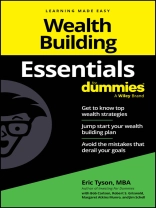The quick-and-easy guide to unlocking the potential of your income
Building Wealth Essentials For Dummies is your go-to guide for learning the key concepts involved in growing your finances, no matter where you’re starting. Small and value priced for the budget conscious, this book breaks down investing, taxes, retirement planning, and all the other wealth-building fundamentals you need to know. Each section gives you tips and strategies you can use to increase your net worth. Investment strategies, real estate advice, retirement account basics—and everything you need to make sure you’re not getting too risky with your money. Make a plan and stay on track for your savings goal, with easy-to-understand information and guidance in this Essentials guide.
- Get to-the-point information on saving, investing, and managing your money
- Discover strategies for building wealth and increasing net worth faster
- Easily reference details on retirement accounts and other money matters
- Ensure you’re making smart decisions with risk management and spending tips
Building Wealth Essentials For Dummies is a great buy for personal finance beginners who are ready to start putting their money to work.
Your path to profitable, purpose-driven sales starts here.
Mục lục
Introduction 1
About This Book 1
Foolish Assumptions 2
Icons Used in This Book 2
Where to Go from Here 3
Chapter 1: Developing a Wealth Mindset 5
Focusing on Abundance 5
Avoiding a scarcity mindset 6
Balancing spending and saving 7
Remembering that wealth is about more than numbers 10
Developing a Wealth Mindset Toward Debt 11
Avoiding bad debt 11
Assessing good debt: Can you get too much? 12
Kicking a credit card habit 13
Chapter 2: Practicing Mindful Spending 15
Keeping Lifestyle Inflation in Check 15
Thinking like a saver 16
Living within your means 17
Turning your back on consumer credit 18
Repaying your debt 19
Avoiding the “More Money, More Stuff” Trap 20
Housing expenses 21
Lowering your energy costs 22
Trimming your taxes 23
Keeping an eye on insurance premiums 23
Managing medical expenses 24
Spending less on cars and transportation 25
Considering kid-related expenses 26
Saving on food and dining 26
Reducing phone bills 26
Shopping for technology 27
Finding affordable recreation and entertainment 27
Reducing clothing expenses 27
Paying for hair care and other personal-care services 28
Reducing health club expenses 28
Table of Contents iii
Buying gifts 29
Charitable contributions 29
Vacations 29
Paring down professional expenses 30
Costly addictions 30
Gambling 30
Budgeting: Yes, You Need a Financial Plan 31
Chapter 3: Exploring Winning Investment Strategies 33
Compound Interest: The Eighth Wonder of the World 33
Understanding the primary investments 34
Shunning gambling and “get rich quick” vehicles 36
Understanding investment returns 37
Leaving you with some final advice 38
Exploring Bonds and Other Lending Investments 39
Deciding between individual bonds and bond funds 39
Obtaining bond prices 40
Purchasing Treasuries 40
Shopping for other individual bonds 41
Considering other lending investments 42
Investing in Mutual Funds and Exchange-Traded Funds 43
Exploring various fund types 45
Deciphering your fund’s performance 52
Creating your fund portfolio with asset allocation 53
Chapter 4: Managing Risk Like a Pro 57
Understanding Investment Risks 57
Comparing the risks of stocks and bonds 58
Focusing on the risks you can control 59
Diversifying Your Investments 60
Sticking with your allocations: Don’t trade 61
Investing lump sums via dollar-cost averaging 61
Buying and Selling Stocks 63
Defining “The Market” 63
Buying stocks via mutual funds and exchange-traded funds 66
Using hedge funds and privately managed funds 68
Selecting individual stocks yourself 68
Spotting the right times to buy and sell 70
Avoiding problematic stock-buying practices 70
Proven investment strategies 72
Chapter 5: Investing in a Small Business 75
Owning a Small Business 75
The reasons to own 76
The reasons not to own 77
Starting Your Own Small Business 79
You as the sole owner 79
Sharing ownership 80
Deciding between sole and shared ownership 81
Going public: Cashing in 83
Determining your start-up cash needs 83
Buying an Existing Business 85
Understanding why to buy a business 85
Knowing when you shouldn’t buy 87
Chapter 6: Raking in Profits from Real Estate 89
Homeownership: Building Equity One Brick at a Time 90
Weighing the pros and cons of ownership 91
Knowing when to buy 92
Recouping transaction costs 93
Deciding how much to spend 95
Determining your down payment 95
Selecting your property type 97
Building Wealth through Real Estate Investing 99
Recognizing the drawbacks of real estate investing 102
Comparing real estate to other investments 104
Considering REITs (Real Estate Investment Trusts) 109
Distinguishing between public and private REITs 110
Taking a look at performance 111
Investing in REIT funds 111
Chapter 7: Cutting Your Taxes (Keeping More of What You Earn) 113
Reducing Taxes on Work Income 114
Contributing to retirement investment plans 114
Using health savings accounts 115
Shifting some income 116
Increasing Your Deductions 116
Choosing standard or itemized deductions 116
Purchasing real estate 117
Trading consumer debt for mortgage debt 117
Contributing to charities 118
Remembering auto registration fees and state insurance 119
Deducting self-employment expenses 119
Enlisting education tax breaks 120
Making Tax-Wise Personal Finance Decisions 121
Taming your taxes in non-retirement accounts 122
Avoiding taxing mistakes 125
Hiring a tax professional 130
Chapter 8: Planning Financial Independence 135
Grasping the Keys to Successful Retirement Planning 135
Saving drives wealth 136
Keeping your balance 136
Understanding that planning is a process 137
Figuring Out When You Can Stop Punching the Clock 138
Knowing How Much You Really Need for Retirement 139
Eyeing the components of your retirement plan 140
Crunching the numbers 142
Making the numbers work 144
Dealing with excess money 144
Chariots of Freedom: Your Retirement Accounts 145
Getting the Most from Your Retirement Accounts 148
Prioritizing retirement contributions 148
Setting up a retirement account 149
Allocating money with employer-selected options 149
Allocating money in plans you design 154
Chapter 9: Leaving a Legacy 159
Understanding Estate Planning 159
Studying some strategies before starting your estate plan 163
Why everyone needs a will 167
Avoiding probate through living trusts 168
Power of attorney: Appointing your financial sidekick 169
Answering Key Questions to Gather Critical Information 170
Decreasing Your Estate Taxes 172
Using trusts to reduce estate taxes 174
Giving charitable gifts 179
Chapter 10: Ten Keys to Successful Fund Investing 181
Minimizing Costs 181
Evaluating Historic Performance 182
Sticking with Experience 183
Considering Index Funds 183
Steering Clear of Leveraged and Inverse Exchange- Traded Funds 184
Reading Prospectuses and Annual Reports 185
Assessing Fund Manager and Fund Family Reputations 186
Rating Tax Friendliness 186
Determining Your Needs and Goals 187
Tuning Out the Noise 188
Index 189
Giới thiệu về tác giả
Eric Tyson is a veteran financial counsel or who has dedicated his life to helping people achieve financial success. He is the author of many best- selling titles including Personal Finance For Dummies, Investing For Dummies, and Real Estate Investing For Dummies. This book includes insight from Eric’s expert co-authors: Bob Carlson (Personal Finance After 50 For Dummies), Robert S. Griswold, MSBA, CRE, CPM (Real Estate Investing For Dummies), Margaret Atkins Munro, EA (Taxes For Dummies), and Jim Schell (Small Business For Dummies).












